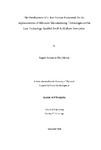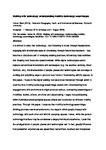An Integrated Model of the Influence of Personal Psychological Traits and Cognitive Beliefs on Customer Satisfaction and Continuance Intentions in Relation to Internet Banking Usage within the Saudi Arabian Context
| dc.contributor.supervisor | Ahmed, Mohammed Zaki | |
| dc.contributor.author | Alghamdi , Ahmed Dirwish G | |
| dc.contributor.other | Faculty of Science and Engineering | en_US |
| dc.date.accessioned | 2014-09-03T15:45:21Z | |
| dc.date.available | 2014-09-03T15:45:21Z | |
| dc.date.issued | 2014 | |
| dc.date.issued | 2014 | |
| dc.identifier | 10172715 | en_US |
| dc.identifier.uri | http://hdl.handle.net/10026.1/3096 | |
| dc.description.abstract |
This thesis examines the effects of Culture, the Unified Theory of Acceptance and Use of Technology (UTAUT), Expectation Confirmation Theory (ECT) and Technology Readiness (TR) on the satisfaction and usage continuance intention of Internet banking customers within the Saudi Arabian context. The aim is to develop and test a new framework for use in determining the factors that affect Internet banking customers’ actual usage behaviours, with a special focus on the role of cognitive processes, and cultural and personal psychological traits. This research uses cross-sectional survey questionnaire methods within a quantitative approach. 261 valid responses were received. Structural Equation Modelling (SEM) was used to test the hypothesised relationships within the research model in Analysis of Moment Structures (AMOS 20) software. ECT is well established in conventional marketing literature and explains how cognitive beliefs and affects lead to customers’ repurchasing behaviour. It was first adopted for the Information Systems (IS) context and then customised to explain IS continuance intention behaviour. However, previous ECT customisations in the IS context present a significant knowledge gap because technology-based services are sensitive to individuals’ psychological traits, which ECT does not account for. This research integrates psychological traits and culture into the ECT framework to explain customer satisfaction and continuance intentions in the context of Internet banking usage. It combines ECT with the UTAUT in order to expand ECT to include more cognitive beliefs. Then it integrates TR and Culture to account for psychological and sociological traits. The results present a new contribution to the body of knowledge by validating a theoretically backed integration of the above models into one structural model. This model broadens the understanding of the factors that influence IS satisfaction and usage continuance intention. Compared to previous studies, the explanatory power of this model is a major improvement, with an R2 of (0.61) for usage continuance intention. | en_US |
| dc.language.iso | en | en_US |
| dc.publisher | Plymouth University | en_US |
| dc.subject | Expectation confirmation theory | |
| dc.subject | Culture | |
| dc.subject | Expectation confirmation model of information systems continuance | |
| dc.subject | The unified theory of acceptance and use of technology | |
| dc.subject | Technology readiness | |
| dc.subject | Technology acceptance models | |
| dc.subject | Technology acceptance model | |
| dc.subject | Theory of planned behaviour | |
| dc.subject | Self-service technologies | |
| dc.subject | Business-to-customer Internet banking | |
| dc.subject | Saudi Arabia, the Kingdom of | |
| dc.subject | Information Systems | en_US |
| dc.title | An Integrated Model of the Influence of Personal Psychological Traits and Cognitive Beliefs on Customer Satisfaction and Continuance Intentions in Relation to Internet Banking Usage within the Saudi Arabian Context | en_US |
| dc.type | Thesis | |
| plymouth.version | Full version | en_US |
| dc.identifier.doi | http://dx.doi.org/10.24382/4090 |
Files in this item
This item appears in the following Collection(s)
-
01 Research Theses Main Collection
Research Theses Main





